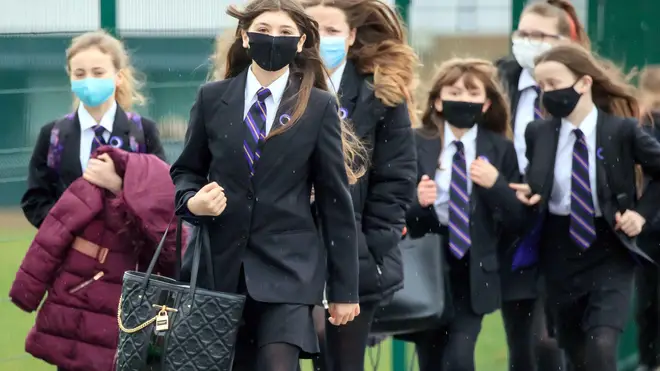
James O'Brien 10am - 1pm
27 December 2021, 12:54 | Updated: 27 December 2021, 16:20

Headteachers are raising concerns ahead of the start of term as the rapid spread of the Omicron variant threatens to cause significant disruption.
Staff shortages could result in entire year groups being sent home, while isolating pupils could miss "high-stakes" mock exams for their GCSEs and A-levels.
The Government is determined to keep schools open, however spiralling cases of the highly infectious strain could still present huge challenges.
READ MORE: PM to receive Covid data briefing as Tory MP advises 'caution' before applying new curbs
READ MORE: New restrictions in Scotland and Northern Ireland come into force with all eyes on PM
The head of a school leaders' union Geoff Barton has said certain year groups could be prioritised if there is limited staff available in the new term.
One approach could be to keep in school Year 11 and Year 13 pupils doing their GCSEs and A-levels, while other year groups learn remotely from home.
The general secretary of the Association of School and College Leaders stressed this would be at the "bottom of the list" of heads' contingency planning.
Mr Barton said: "The question is whether Christmas has worked as a kind of circuit-breaker or whether what we're going to see, with almost ten million children going back into schools next week, whether actually you very quickly get increased numbers of staff being affected. There's just lots of uncertainties."

Andrew Castle caller is 'absolutely sick' of Covid restrictions
He said schools were doing "scenario planning" before their pupils returned and that "in the worst-case scenario, if you couldn't cover all of your year groups in that situation, you would have to make a decision - in secondary, for example, are you going to say exam classes come back and others are remote learning?"
Mr Barton said heads did not want this to happen but were "basically doing what wasn't done by the Government last year, which was scenario planning".
Schools might also run staggered returns as they carried out on-site testing of pupils, he said.
On mock exams early next term, Mr Barton added: "I think one of the concerns will be what if we find that there's quite a lot of young people who aren't around to be able to do those mock exams - do they need to be changed to another time?"
READ MORE: People urged to start New Year by getting Covid jab with millions of slots available
READ MORE: Chaos for rail passengers as trains hit with triple blow of Omicron, planned closures and strikes

Rachel Johnson says Boris insisted on Covid rules
He said this would be less of an issue "in normal times" but the mocks were more "high stakes" this year as they could be used as a back-up if exams were cancelled.
"So, it's not a case of saying 'let's not bother with mocks', because you will need to do those mocks at some point," he said.
Mr Barton said schools would need to think about when to run mocks if they could not take place next week.
In November, exams regulator Ofqual published guidance advising that A-level and GCSE students should sit termly assessments to ensure there was enough evidence to determine their grades in case exams were cancelled again.
Ofqual published guidance for teachers on how they should gather evidence to assess pupils' performance if exams could not go ahead in 2022, with teachers advised to assess students "under exam-like conditions wherever possible" to help inform teacher-assessed grades if needed.